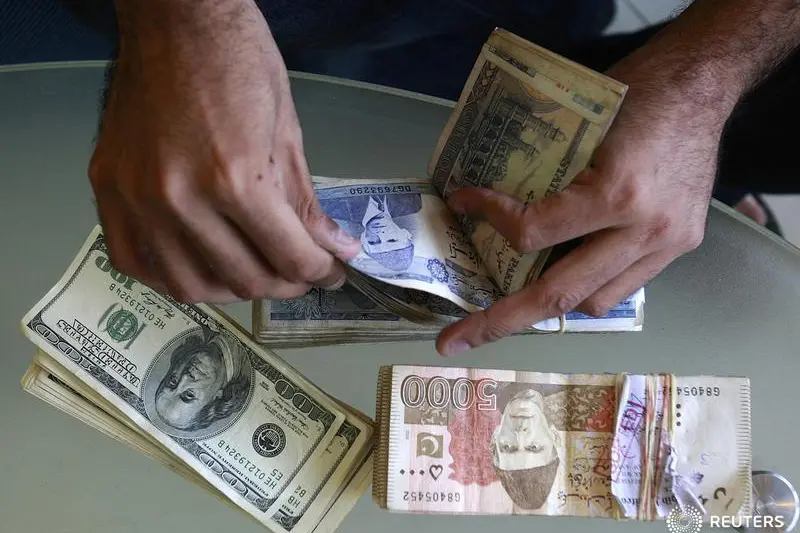PHOTO
The currency surged 1.44 per cent against the US dollar in the interbank market and closed at 172.78. It recovered Rs2.49 after opening the trade at 175.27 against the US dollar. It has depreciated around 13.6 per cent since May.
Pakistan stock market also celebrated the positive news and climbed 1.38 per cent before the suspension of trade, according to its website.
Addressing a press conference in Islamabad, adviser to Prime Minister on Finance and Revenue Shaukat Tarin said Saudi Arabia would provide $4.2 billion to Pakistan to overcome its balance of payment issues and address energy problems faced by the country. The financial package includes a $3 billion cash assistance and $1.2 billion worth of oil supply on deferred payments.
The adviser, who was flanked with energy minister Hammad Azhar, said that some of the amount had already been released on Tuesday.
“The rate of interest on the loan would be 3.2 per cent.
The latest development comes two days after Prime Minister Imran Khan returned from a visit to Saudi Arabia.
Prime Minister Imran Khan thanked the Saudi Crown Prince Muhammed bin Salman said Saudi Arabia always supported Pakistan in difficult times.
“I want to thank HRH Prince Mohammad bin Salman for supporting Pak with $3 bn as deposit in Pak’s central bank & financing refined petroleum product with $1.2 bn. KSA has always been there for Pak in our difficult times incl now when world confronts rising commodity prices,” Imran Khan tweeted.
In a series of tweets, Pakistani ministers also shared the announcement and said Saudi timely financial assistance will help Pakistan’s economy facing a challenging environment in the wake of rising commodity prices and the Covid-19 pandemic.
In a tweet, Pakistan’s Information Minister Fawad Chaudhry said Saudi Arabia would deposit $3 billion cash in the State Bank of Pakistan while $1.2 billion worth of oil will be provided on deferred payments.
“Saudi Arabia announcement support Pakistan with 3 billion US dollars as deposit in Pakistan central bank and also financing refined petroleum product with 1.2 billion US dollars during the year,” he wrote.
In a tweet early Wednesday, Tarin and Hammad Azhar also said the package will help ease pressures on Pakistan trade and the foreign exchange reserves, which dipped by $1.7 billion to $17.5 billion during the week ending October 15.
“The Saudi Development Fund has generously announced for Pakistan an oil deferred payments facility of $1.2bn/annum and a $3 bn deposit with SBP. This will help ease pressures on our trade & forex accounts as a result of global commodities price surge,” Hammad Azhar tweeted.
Lifeline to economy
Samiullah Tariq, head of research at Pakistan Kuwait Investment Company, said the Saudi package would help ease pressure on Pakistan’s foreign exchange reserves and the rupee due to the recent sharp hike in global commodity prices.
“This agreement would help Pakistani economy mitigate the impact of rising global commodity prices,” Tariq told Khaleej Times on Wednesday.
It is the second financial assistance package that Saudi Arabia has extended to Pakistan in the past three years.
The Kingdom had extended a similar package valued $6 billion in October 2018 to provide breathing space before starting negotiations with the International Monetary Fund (IMF). Later Pakistan had to return $2 billion of the $3 billion deposits.
Next is IMF deal
Tarin denied having any link between the Saudi Arabia’s $4.2 billion package and ongoing talks with the International Monetary Fund (IMF) for resumption of its $6 billion extended fund facility programme.
“Talks with IMF are nearing successful completion and announcement would be made soon,” the advisor said, adding that the agreement had already been made before he flew from Washington last week.
“The $4.2 billion Saudi facility and upcoming agreement with the IMF would have positive impact on market, so there should be no uncertainty,” Tarin said.
Inflation is still low
About the inflation, the adviser said that oil prices in Pakistan are the lowest as compared to other countries in the region.
He said, keeping in view the purchasing power parity,
“Pakistan is one of the cheapest countries in the world if we consider the purchasing power parity as a benchmark. Although, per capita income is low in the country, the prices of commodities are also low as compared to the other counties of the world,” Tarin said.
Hammad Azhar said inflation is a global phenomenon as the whole world was passing through commodity cycle.
“After the Covid-19 pandemic, almost all the countries gave stimulus packages to support their economies. So every country, irrespective of being poor or rich, witnessed hike in commodity prices,” the minister said.
”Oil prices in Pakistan are low, except the oil producing countries, whereas the gas prices were not increased since 2019, which have gone up by five to 10-fold in European countries,” he said.
Likewise, Azhar said prices of urea fertilizer are low whereas the government had to provide Rs450 billion tax relaxations to lower the burden of increasing oil prices in international marker. He expected that the world commodity cycle would break within around six months and the prices in world market would come down leaving positive impact on inflation in Pakistan.
On Financial Action Task Force (FATF), the minister said that Pakistan has made tremendous progress on two simultaneous plans.
“The country had completed 26 out of 27 action points of earlier plan and majority of the FATF members had expressed satisfaction made over the remaining one point,” he said.
Moreover, out of 7 points of FATF June plan 4 have been completed, which he said was history in FATF to have completed 50 per cent of action plan in first review.
Copyright © 2021 Khaleej Times. All Rights Reserved. Provided by SyndiGate Media Inc. (Syndigate.info).





















